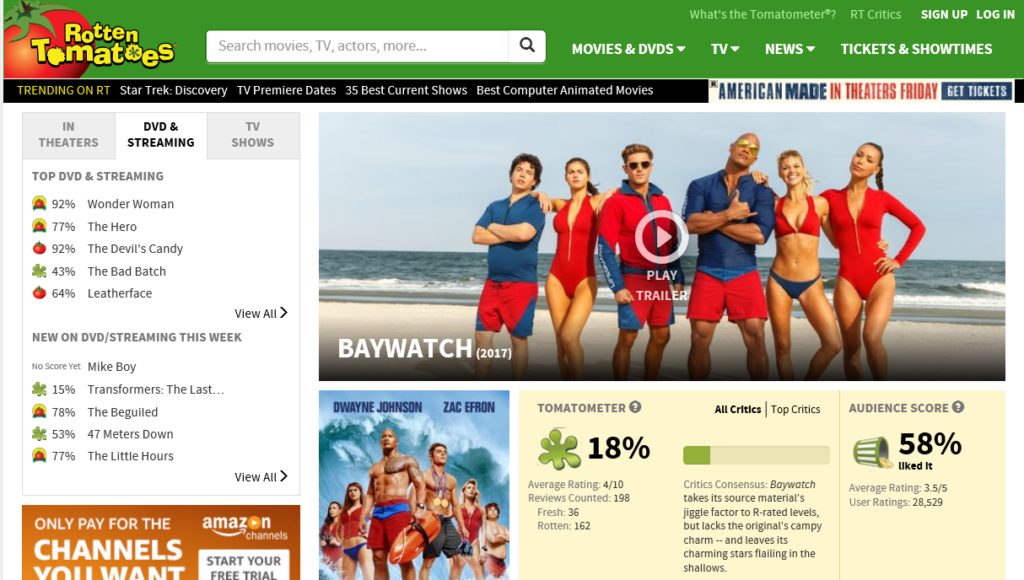 We often talk about traditional media in this blog – radio, TV, and even newspapers. But another traditional medium – the movie business – is in the crossfire today as they call it a wrap on one of the worst summers in motion picture history.
We often talk about traditional media in this blog – radio, TV, and even newspapers. But another traditional medium – the movie business – is in the crossfire today as they call it a wrap on one of the worst summers in motion picture history.
There’s been one stiff after another. And while Americans used to flock to theaters in the summer months, many are content to be out and about or hole up in their media rooms watching Netflix, Hulu, and other on-demand programming.
How bad was it?
The New York Times reports it was the worst summer in two decades, down 15% from last year. There are many possible explanations for this cinema nadir.
Bad movies, too many lame sequels, the incursion of video streaming platforms like Netflix, and even bad marketing are all part of the story.
Yet, many industry insiders are blaming the review website, Rotten Tomatoes, as the culprit that explains the summer’s decline. That same Times story by Brooks Barnes is a comprehensive, well-detailed analysis of the issues on both sides of the movie aisle about whether bad reviews are, in fact, the driver that has hurt the film industry the most.
Producers are incensed by the site, claiming it oversimplifies ratings and has an outsized influence on movie attendance. Clearly, review sites of all kinds have become more influential, and Rotten Tomatoes – in particular – has grown by leaps and bounds just in the past year.
But those behind Rotten Tomatoes point to stringent site requirements that vet online critics. The Times quotes company executive Paul Yanover who accepts the power of both good and bad reviews but notes that pinning the blame on the site is just making excuses:
“I don’t think Rotten Tomatoes can definitively make or break a movie in either direction. Anyone who says otherwise is cherry-picking examples to create a hypothesis.”

If this story has a ring of familiarity to it, it may be because of the way that radio station managers and programmers have been irked by Arbitron and then Nielsen – often blamed for ratings woes.
And as we know, ratings are “estimates” and they are far from perfect. It’s not hard to discredit any rating book – the oddities, the inconsistencies, and the ambiguities. I know, because as Research Director for WRIF and then ABC’s Owned FM Stations, part of my job was to uncover ratings anomalies and the oddities – whenever we had a down book.
More often than not, however, stations that perennially struggle in the ratings have larger problems – often unpinned from ratings methodology and sampling issues. Maybe they’re in the wrong lane, perhaps it’s execution issues, or it could be a signal deficit. And like the movie industry, the really appealing films – whether popcorn movies or independent releases – almost always find a way to attain success. The same tends to be true for radio.
That said, the irony in radio ratings is that Nielsen is the box office – the score card that can make or break a station, a format, or both. And unlike Rotten Tomatoes which accepts only peripheral responsibility for epic fails like “The Mummy,” Nielsen actually helps stations identify where their own methodology or meter placement has gotten awry. Sadly, that happens with regularity in market after market.
This is where outside research studies can be an important piece of the puzzle. Rating books only provide surface data – who is listening and when. In-depth research studies provide the “why’s” behind listening. They can tell you everything from top-of-mind-awareness to perceptual ownership of “hills.” And while they cannot solve all problems, they are typically illuminating and helpful when in the hands of a smart, strategic team.
If the movie industry’s “smoking gun” theory is correct – that Rotten Tomatoes is the catalyst behind its bad box office numbers – it would be simple to improve in a simple study of consumers and their movie consumption habits. Something tells me “Baywatch” would have sucked in a perceptual research study.
 And two final thoughts…
And two final thoughts…
Ironically, Rotten Tomatoes – which started as a student-run site at UC Berkeley – is now owned by Fandango, a company that’s in the business of selling movie tickets online and is a unit of NBC Universal, owners of Universal Pictures. Warner Brothers has a stake in Rotten Tomatoes, too.
And shouldn’t those of us in radio be happy there’s not a consumer/critics review site for our stations? There would be no shortage of “kersplats” as listeners would hurl virtual tomatoes at stations and DJs they feel aren’t worthy.
So, good luck in the fall book. You have a better chance of winning than “The Emoji Movie” with a “Rotten Tomatoes score of just 7%. Even animated poop emojis couldn’t save this film from being the biggest loser of the summer.
- Radio’s New Audience Equation: Z Over Y = Trouble - May 1, 2025
- What Is It With Female Robot DJs? - April 30, 2025
- Why “Dance With Those Who Brung You” Should Be Radio’s Operating Philosophy In 2025 - April 29, 2025




And I thought it was Donald Trump’s fault…
That, too.
Maybe pricing is an issue too? Not sure about the States, but here in Canada 15 bucks for a ticket, 6 bucks for popcorn made yesterday and 5 bucks for a bottle of water??? A movie night quickly becomes a significant expense.
No doubt, but back in the day, you didn’t think twice about seeing “Raiders of the Lost Ark” (or the big summer movie) – it was an event. What’s worthy shelling out that kind of money for? Thanks, Dave.
Fred, an aside on today’s blog. Maybe this made a difference, maybe it didn’t, who knows, it’s like ratings, all voodoo math unless your station is doing well. A higher percent of the nation was unable to attend movies this summer… 20% of the State of Texas, all of the State of Florida, parts of Washington, Oregon, California, North Carolina, South Carolina, Montana and Idaho… than in any summer past. When you are worried about your home burning up or floating away movies take a back seat.
It’s always something. The external factors, as you point out, matter.
From a rock radio POV, a hot local sports team – or one that makes a championship run – can have a destabilizing impact on the market. And here in Detroit, I remember every year or two, we’d dub it “The Blizzard Book” that would favor the news/talk stations, often at the expense of everything else. It’s like that I’m markets like Chicago, Minneapolis, Boston, etc.
Thanks for the comment.
While this article can speak to all of us…
What are we doing to “not be lame”. Are we doing (saying) things that insult listeners intelligence–most importantly, on-air?
This all goes back to a saying I heard from an OM: “lull them (listeners) into a sense of satisfaction”…
All that Glitters is NOT GOLD! Bigger is NOT better.
Say what you are, who you are and DO IT, Everyday!
Max, it’s the basics. Thanks for commenting.
You make the point, Fred -about “critics and reviews” for radio. They exist! At one point it was the general manager’s wife. Now…well, everyone’s an expert. The sales department knows your station better than you do(!). Okay I’m being mean. But, there’s a lot of lousy radio out there, and no one’s being held accountable. I heard a NETWORK reporter talking about the “Jacksonville Jag-Wires” on Sunday. That’s the sign of a real problem in our industry. We focus in on music and content but ignore the fact that a good 20-25% of each hour is crammed with commercials that the listener doesn’t care about, and PPM has created the “shut up and play the hits” mentality. It’s clear that people want a balance..and getting someone (anyone) to figure that out is nearly impossible….in my opinion.
I struggle with this, Dave, wondering whether today’s radio is incrementally or vastly worse (or better?) than it was 10, 20, 30 years ago. Through the lens of the past, we all glorify the stations we worked with (as does the audience). Is it that radio has become that much worse or is the competition around us better or more interesting? And if the latter’s the case, it still means we must do better to keep up. Thanks for the thoughtful comment.